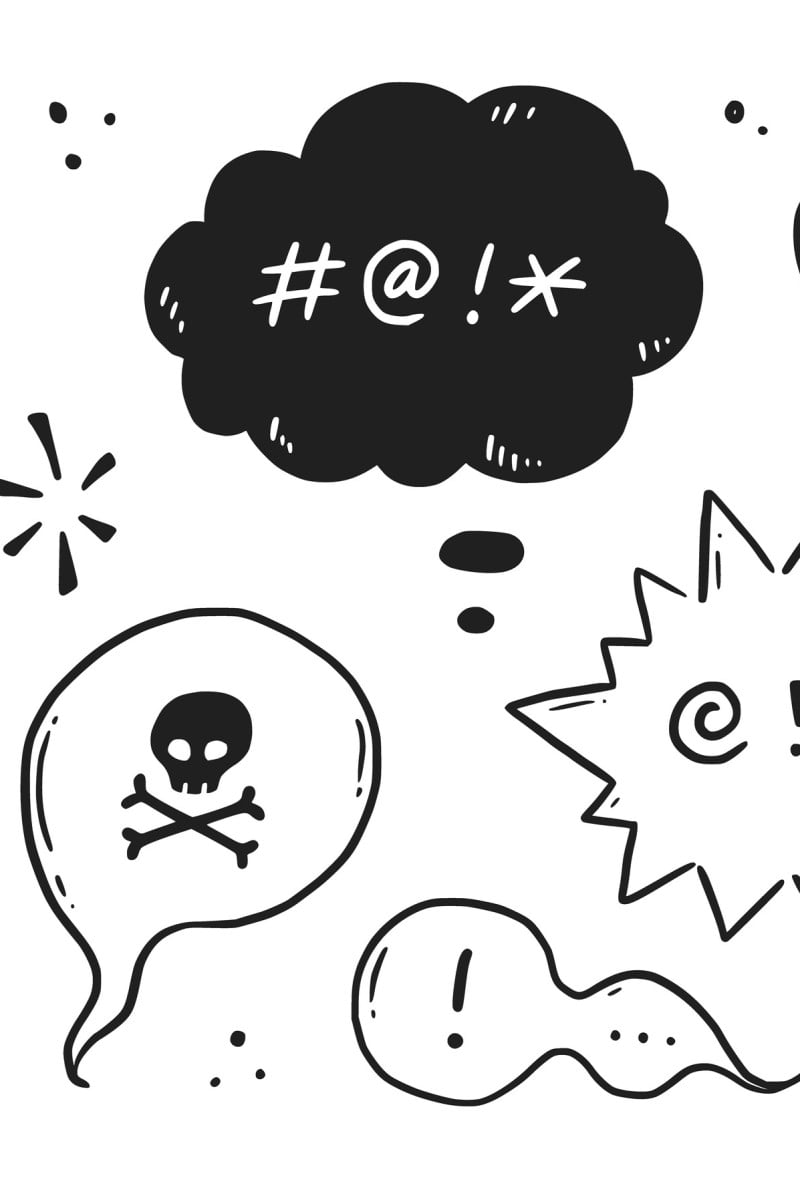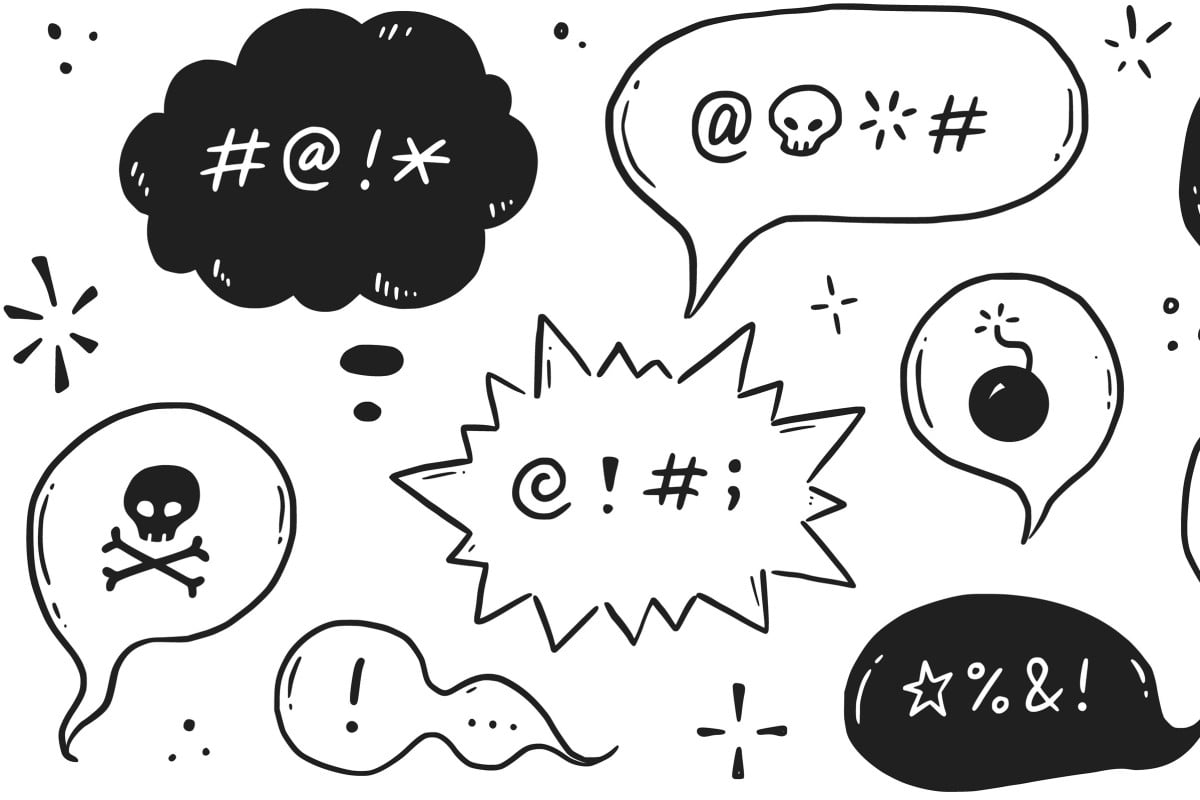
Face Off: Should students be punished for swearing on a school’s campus?
Each week, two readers discuss a hot topic in a parliamentary-style debate that doesn’t necessarily reflect their personal viewpoints.
 Swearing and cursing is common, but should it be allowed inside schools? Two readers debate. Photo: Shutterstock
Swearing and cursing is common, but should it be allowed inside schools? Two readers debate. Photo: ShutterstockIf you are interested in joining future Face Off debates, fill out this form to submit your application.
For: Sarina Wan Tsz-ching, 17, Sacred Heart Canossian College
Students should be punished for swearing on campus. Swearing is using words or phrases generally considered profane or obscene to express anger or other strong emotions. It may create tension between students, leading to conflict or a breakdown in friendship and peer relationships.
Offensive Language by Jim O’Driscoll – a senior lecturer of the English language and linguistics at the University of Huddersfield in the United Kingdom – highlights a defining feature of swearing: its potential to offend, disrespect and evoke a negative reaction from others.
The most recognisable contemporary swear words relate to religion, sex, body parts and words associated with excretion, according to a 2022 study published in linguistics academic journal Lingua. Curse words could also be culturally offensive.
If students who swear are not stopped immediately, they will assume this behaviour is acceptable and potentially make it a habit. This could escalate into verbal abuse, harming other students.
Your Voice: Empower domestic violence survivors, accessible learning resources (long letters)
According to findings by scientific research publisher Frontiers Media, adolescents use imitation to feel a sense of connection and belonging. If swearing is not addressed, students may start imitating each other, believing it is acceptable.
Students influence each other. This would lead to widespread use of profanity, creating a hostile or uncomfortable learning environment.
Some swear in casual situations to express surprise or start a funny conversation. Others swear because they think it is “cool”. As a result, those who react negatively to swearing might be excluded or even bullied.
A punishment for swearing could act as a deterrent and also a way to help students understand why it is inappropriate for a school campus. Clear boundaries and expectations can guide students, helping them avoid taboo language. Reflecting on word choice, including the meaning and origins, can educate students and encourage them to adjust their behaviour.
A school is representative of society, readying students on how to act and behave in the future. Helping them understand the weight of their words and actions will create a positive, respectful learning environment and prepare them for the future.
Face Off: Should students be able to wear their own athletic clothes for PE classes?
Against: Hazel Cheung, 15, Island School
Swearing is a natural phenomenon found in practically every language. While the behaviour can be considered rude, it is important to look at the context and understand why people swear.
Swearing can make people feel powerful, and when someone has a strong, overwhelmingly negative emotion, swearing acts as a release and makes the speaker feel in control of the moment.
A study from Keele University in the United Kingdom also reveals that swearing increases an individual’s pain tolerance. This was tested by putting participants’ hands in ice-cold water for as long as possible. Those who repeated a swear word were able to keep their hands in for at least 40 seconds longer.
Swearing is also a form of bonding between friends. People often swear when they are comfortable around others, which solidifies a sense of camaraderie and solidarity.
Swear words are also tools used in wordplay to emphasise something and can very often be the crowning star of a funny joke that only you and your friends would know.
Your Voice: Let students sleep, promoting environmental initiatives (long letters)
Students should not be punished for swearing. In a way, if school faculty prohibits students from using foul language in school, it limits students’ ability to articulate and express themselves when non-profane language fails them.
Plenty of secondary school students are not offended by swear words, and the language is used often in adolescent conversations. We should trust students to have good judgment, knowing when and what words can be used. I would argue most students do not use profanity when it is unnecessary.
Punishing students for using profane language in casual situations also takes away from other glaring issues that warrant punishment, such as vandalism or bullying.
Some might point out that profane language could be used in bullying. However, the offending student should be punished for the intended crime – harassing one of their peers, not simply using profane language.
If profanity turns into the use of racial and ethnic slurs, that is precisely when a staff member should step in and educate the offending student about the connotations of these words.
In conclusion, students should not be punished for swearing on campus unless the language is used to harm others, such as harassing a peer or insulting a marginalised community.
